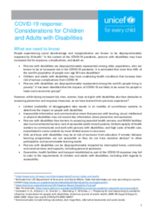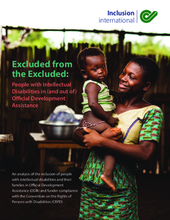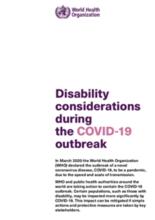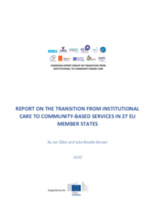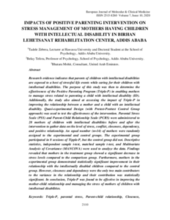Displaying 151 - 160 of 494
UNICEF has produced a guidance note on considerations for children and adults with disabilities in the COVID-19 response.
This report analyzes data available through the Organization for Economic Cooperation and Development (OECD) Development Assistance Committee (DAC)’s Creditor Reporting System (CRS), which reveals that many mainstream development projects fail to include people with intellectual disabilities, including children. The report includes guidance for ensuring CRPD-compliant project funding, including examples of community living projects that align with the CRPD, such as supporting the transition of people with disabilities from institutions to independent living and providing training for families on supporting their children with disabilities at home.
This briefing from the World Health Organization (WHO) outlines actions for meeting the needs of people with disabilities during the COVID-19 pandemic.
In the light of the COVID19 pandemic and with the aim to support a disability-inclusive response to the crisis, International Disability Alliance (IDA) has launched this webpage to share the most recent updates and resources as they become available.
The 2020 Global Education Monitoring Report recognizes the contexts and challenges facing countries in providing inclusive education; the groups at risk of being excluded from education and the barriers individual learners face, especially when various characteristics intersect; and the fact that exclusion can be physical, social (in interpersonal and group relations), psychological and systemic.
The aim of this report was to collate information about policies and plans, changes over time, strengths and areas of concerns relevant to advancement in deinstitutionalisation in 27 EU countries and for six target groups: adults with disabilities, adults with mental health problems, children (including children with disabilities), unaccompanied or separated migrant children, homeless persons and older adults.
In the light of the COVID19 pandemic and with the aim to support a disability-inclusive response to the crisis, International Disability Alliance (IDA) has launched this webpage to share the most recent updates and resources as they become available.
This post from the UNICEF Europe and Central Asia website describes how UNICEF is mobilizing to protect marginalized and vulnerable children – including those with disabilities – against the impact of COVID 19 in the region.
The purpose of this study was to determine the effectiveness of the Positive Parenting Program (Triple-P) in enabling mothers to manage stress related to parenting a child with intellectual disability (ID).
The purpose of the study was to uncover challenges during the transition to adulthood for youth with disabilities who experienced foster care and elucidate the supports most beneficial in addressing these challenges.

